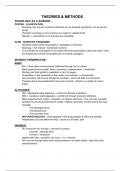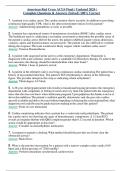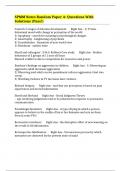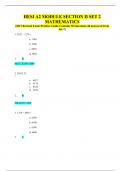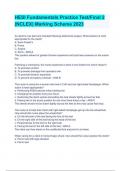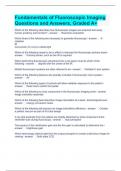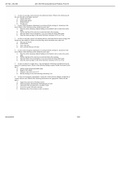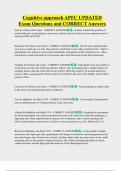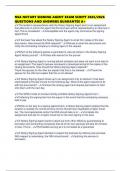SOCIOLOGY AS A SCIENCE :
POPPER : FALSIFICATION
- Sociology can only be a science if theories can be tested & hypothesis’ can be proved
wrong
- Therefore sociology is not a science as it seeks to validate itself
- Marxism = unscientific bc it’s theories are untestable
KUHN : SCIENTIFIC PARADIGMS
- Scientists share similar assumptions / paradigms on theories
- Sociology = not mature / mainstream science
- Is unscientific bc sociologists do not share the same assumptions about the world - they
are divided into schools of thoughts with no shared paradigms
MARXIST PERSPECTIVE :
MARX
- W/c = false class consciousness reinforced through the r/c values
- Base superstructure model, base = economy, superstructure = institutions
- Workers sell their profits to capitalists in turn for wages
- Competition in the ownership of the means of production = concentrated
- W/c revolution will occur & will lead to socialism - which will lead to communism
- Theories about class polarisation have not occurred - criticism on validity of marx’s
theory
ALTHUSSER
- ISA = ideological state apparatus - control w/c through institutions
- RSA = repressive state apparatus - control w/c through physical institutions
- Base-superstructure model = simplistic, no relative autonomy / only one way causality
- Created the structural determinism model = relative autonomy of each level & two way
causality
- The ideological level
- The political level
- The economic level
- IAN CRAIB ANALOGY : what happens in the lying quarters & office are partially
independent, but can affect the shop - cause it to be sold / split
GRAMSCI
- R/c control the w/c through : coercion & consent
- Coercion : physical force
- Consent : institutions
- Agrees with marx, revolution can occur - r/c = minority
- W/c can see through false class consciousness to a certain extent - they have dual
consciousness !
, - W/c revolution can take place - but there needs to be a counter hegemonic bloc in place
first
FUNCTIONALIST PERSPECTIVE :
DURKHEIM
- Social solidarity & social cohesion = achieved & maintained through socialisation
- Society is influenced by external social factors = help shape an individual
PARSONS : VALUE CONSENSUS
- Value consensus = glue that holds society together
- People are integrated into value consensus through socialisation
PARSONS : ORGANIC ANALOGY
- Parts of society mirror the organs within a biological organism
PARSONS : CHANGES WITHIN A SYSTEM
- Changes occur within the system
- Process of changes occur about the system
PARSONS : AGIL SCHEMA
- Adaptation = provides goods / services for ppl = instrumental role
- Goal attainment = goals are selected & resources are allocated to achieve them =
instrumental role
- Integration = parts of society must work together to ensure social cohesion = expressive
role
- Latency = processes within a social system maintain it = expressive role
MERTON’S INTERNAL CRITICISMS
FUNCTIONAL INDISPENSABILITY
- Parsons = things function are functionally indispensable - cannot be replaced
- Merton = there are functional alternatives
- Eg. other institutions are able to perform the same function as the family are
FUNCTIONAL UNITY
- Parsons = institutions within society = tightly linked & integrated to ensure society works
- Merton = some institutions within society are loosely linked, eg. sports & banks
UNIVERSAL FUNCTIONALISM
- Parsons = everything in society works properly
- Merton = what works for one, does not work for another. Not all institutions are
functional, some are dysfunctional

